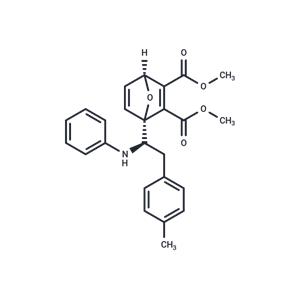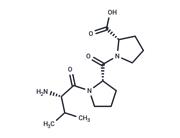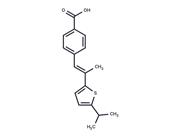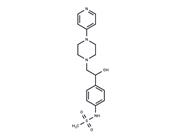| Name | COH000 |
| Description | COH000 is a covalent and irreversible inhibitor of small ubiquitin-like modifier (SUMO)-activating enzyme and inhibited SUMOylation (IC50: ~ 0.2 μM in vitro). |
| Cell Research | Cell proliferation was measured using a CellTiter 96 AQueous One Solution Cell Proliferation Assay (MTS-based) after COH000 or its analog (54 or 55) treatment at the indicated concentrations and the time points. Briefly, cells were incubated with 20 mL of CellTiter 96 AQueous reagentafter the treatment and incubated at 37C until color development. Absorbance measurements were performed using a SpectraMax M5 reader. For assays measuring anti-proliferation effects, all values were normalized to the vehicle treatment. All values are represented graphically as mean ± standard deviation (STDEV) from three independent samples (n=3). |
| Kinase Assay | Briefly, SAE, Ubc9, GST-SUMO and His6-RanGap-1 proteins were expressed and purified as described previously.Assay buffer contained 50 mMTris-HCl pH 7.4, 0.3 mM DTT, 10 mM MgCl2, and 0.005% Tween-20. The assays were conducted using 1536-well, white plates. 2 μL of Mixture 1, containing 12.5 nM SAE and 100 nM His6-RanGap-1 in the assay buffer was mixed with 70 nl of 2 mM compounds dissolved in DMSO. Then 2 μL of Mixture 2, containing 20 mM ATP, 12.5 nM E2 and 30 nM GST-SUMO in assay buffer, was added. After incubation for 90 min at room temperature, 1 μl of pre-mixed Ni acceptor beads and Glutathione Donor beads, at 10 μg/ml each, was added. After incubation for 60 min at room temperature, readings were made on a BMG LabtechPheraStar in an AlphaScreen mode (Ex: 680 nm; Em: 570 nm). |
| Animal Research | Mice were housed in a controlled environment (12-h light/12-h dark cycle) with access to waterand fed a standard diet generally from 6 to 8 weeks of age. Body weight was measured weekly and food intake was monitored. For colorectal cancer xenograft with COH000 treatment, HCT116 cells were s.c. injected into a plasma esterase-deficient SCID mouse strain (Es1e/SCID), male, 8-10 weeks. When the tumors became palpable, COH000 was administered subcutaneously peritumoral injection once a day at a dose of 10 mg per kilogram of body weight. Mice in the control group received equal volumes of vehicle (5% DMSO, 30% solutol in PBS). Tumor volume was measured until the endpoint was reached. Mice were euthanized using CO2 inhalation and tumors were excised. |
| In vitro | COH000 inhibited SUMOylation with an average IC50 of approximately 0.2 μM in vitro but did not inhibit ubiquitylation in a Ubc13-mediated poly-ubiquitylation assay tested under the same condition at concentrations up to 100 μM. COH000 treatment induced apoptosis in HCT-116 cells. The level of apoptosis was reduced when SAE2 was overexpressed by transfection and was increased when SAE2 was knocked down in HCT116 cells. |
| In vivo | Once the tumor became palpable, the tumor-bearing Es1e/SCID mice were treated with COH000 or vehicle for 14 days. COH000 significantly inhibited tumor growth. In addition, COH000 significantly reduced SAE2 levels in tumor tissues. |
| Storage | Powder: -20°C for 3 years | In solvent: -80°C for 1 year | Shipping with blue ice. |
| Solubility Information | H2O : < 0.1 mg/mL (insoluble)
DMSO : 35.71 mg/mL (85.13 mM), Sonication is recommended.
|
| Keywords | Ubiquitin conjugating enzyme | E1 activating enzyme | COH000 | E1/E2/E3 Enzyme | E2 conjugating enzyme | Ubiquitin ligase | Ubiquitin activating enzyme | COH-000 | COH 000 | Inhibitor | E3 ligating enzyme | inhibit |
| Inhibitors Related | NSC697923 | PYZD-4409 | Nutlin-3 | NAcM-OPT | RG7112 | PYR-41 | BC-1382 | NSC232003 | NAE-IN-M22 | Indole-3-carbinol | Idasanutlin | Navtemadlin |
| Related Compound Libraries | Target-Focused Phenotypic Screening Library | Bioactive Compound Library | Ubiquitination Compound Library | HIF-1 Signaling Pathway Compound Library | Inhibitor Library | NO PAINS Compound Library | Bioactive Compounds Library Max | Covalent Inhibitor Library |

 United States
United States



